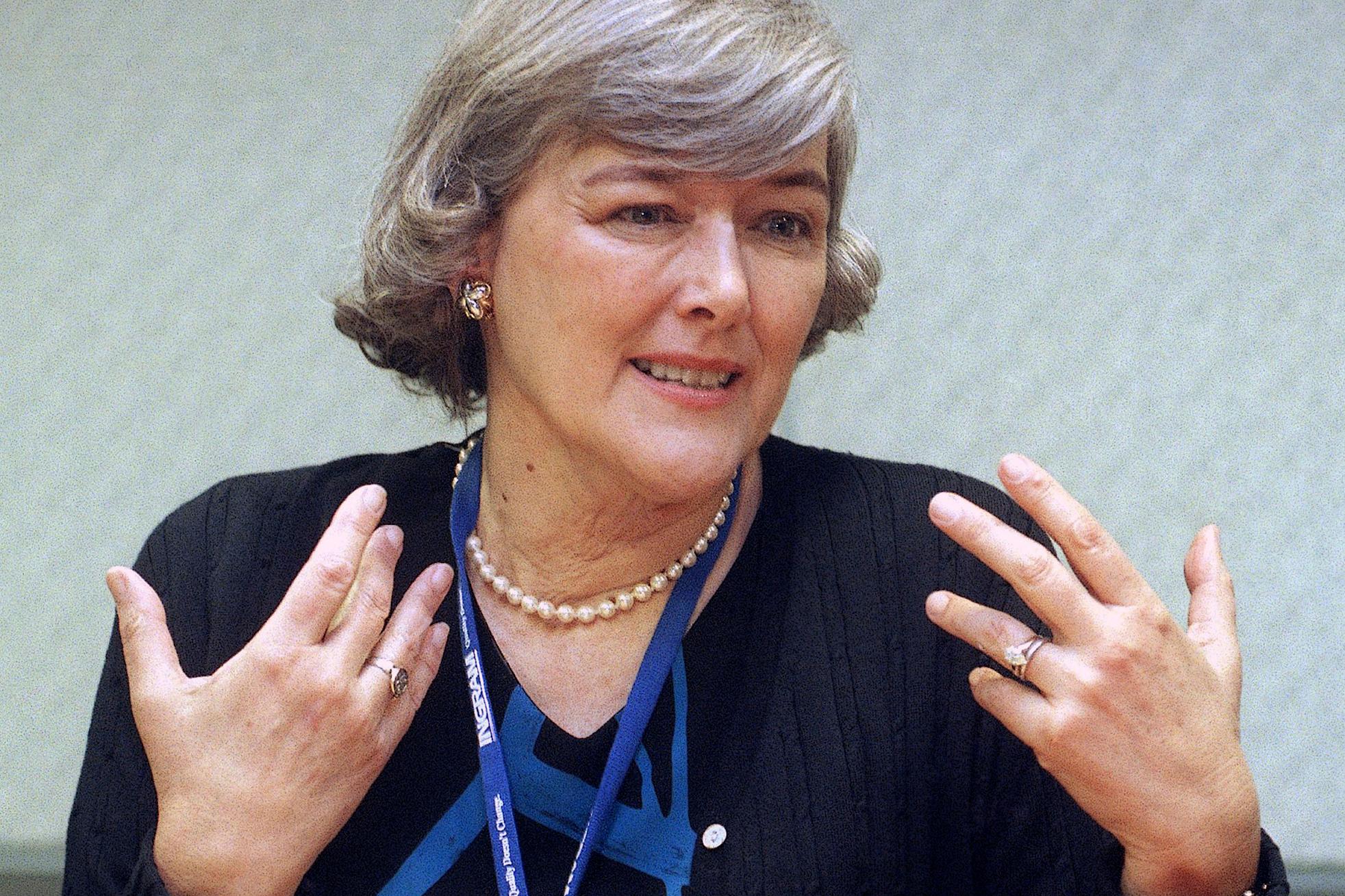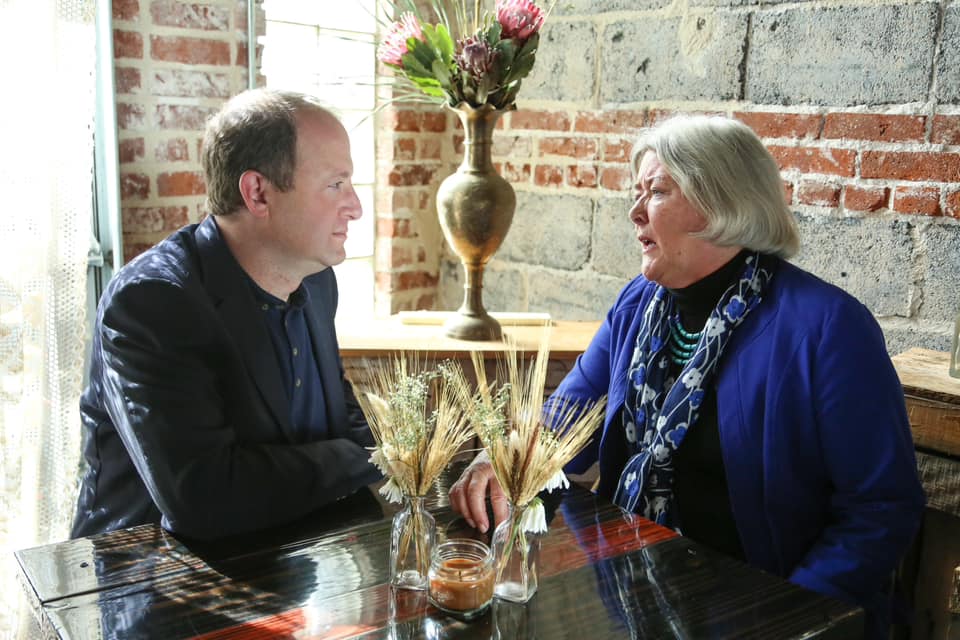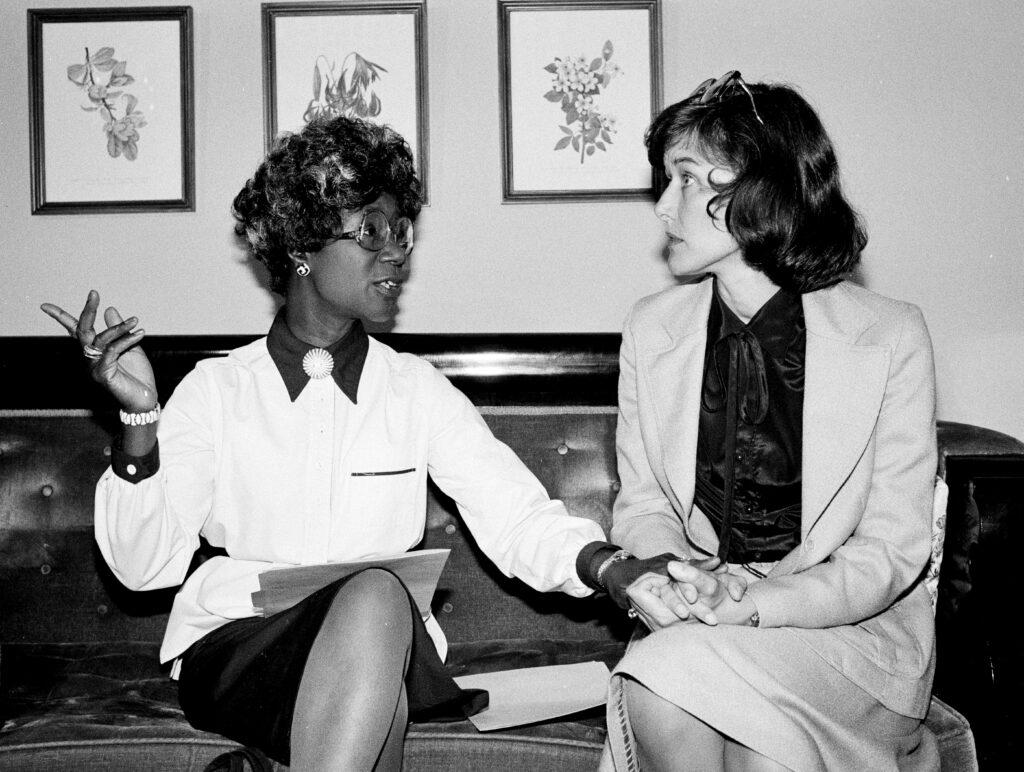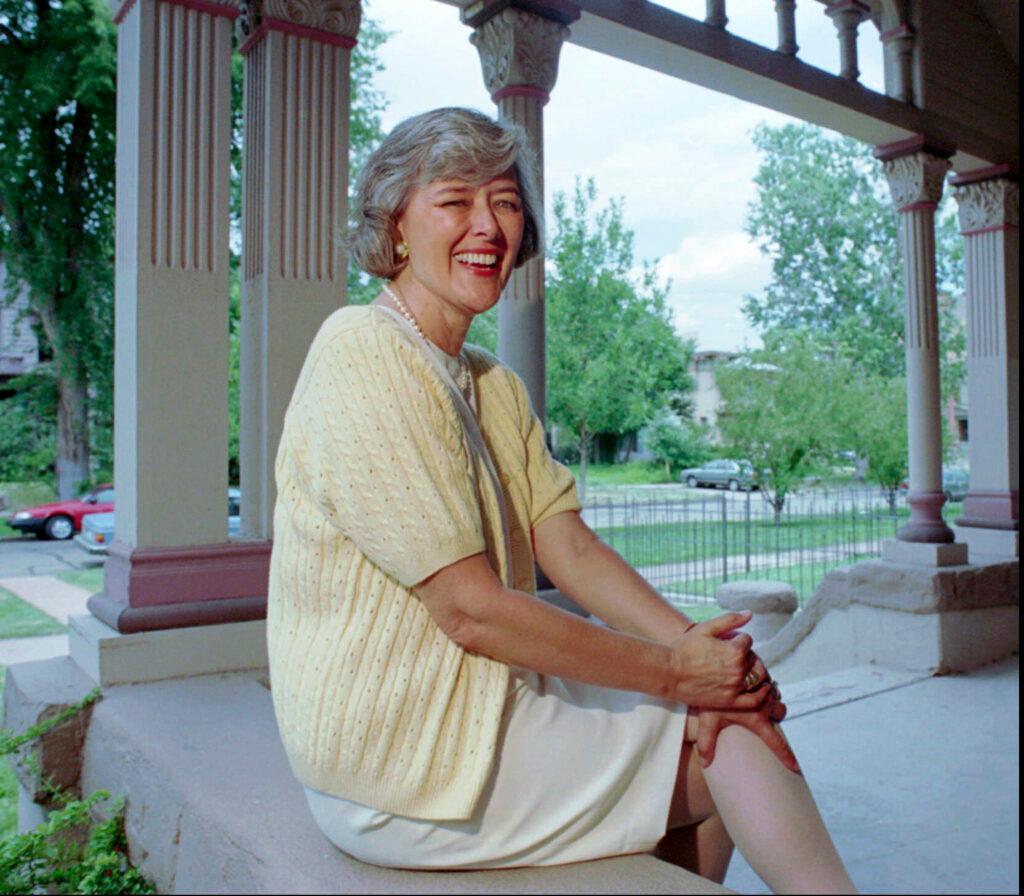
Coloradans and people elsewhere are remembering former U.S. Rep. Pat Schroeder, a trailblazer who paved the way for women's rights in national and local politics. She died Monday at 82.
“Representative Schroeder was a one-of-a-kind leader and barrier breaker," said Gov. Jared Polis in a statement late Monday. "Our daughter's future and women across our country’s future are better thanks to her service. ”
Schroeder was the first woman to represent Colorado in Congress. She had a stroke recently and died at a hospital in Florida, where she had been living, according to her former press secretary, Andrea Camp.
Her legislative record included several bills that helped advance women's rights, from the Pregnancy Discrimination Act to the Family and Medical Leave Act of 1993.
In the male-dominated halls of Congress, she was known for her quick wit and barbs. She coined the phrase “Teflon President” for former President Ronald Regan, a moniker that still sticks for any politician who can avoid blame. When asked how, as a mother of two young children, she’d balance Congress and her family, she famously replied, “I have a brain and a uterus and I use both.”
Polis knew her since he was a kid and described Schroeder as a mentor.
"She championed family leave, healthcare, and equal rights. She was known and loved for her incredible sharp wit," Polis said in a post on his Facebook page. "Her passion, her love for country will be missed not only by those who knew her, but by our whole state and the entire nation. Farewell Pat, and thank you for being uniquely yourself."

President Joe Biden said Schroeder "stood up for basic fairness, sensible policy, and women’s equal humanity.
"I saw firsthand Pat’s moral compass, legal mind, and political savvy when we worked together on the Violence Against Women Act," Biden said in a statement. "She was the primary sponsor in the House; I led the charge in the Senate. Together, we got it done. With Pat as my partner, I never doubted that we would."
Schroeder served as national co-chair for then Colorado Sen. Gary Hart’s presidential run in 1987. Hart described her as a longtime dear friend and very effective member of Congress.
“She was highly intelligent and took the responsibilities of public service seriously. The citizens of the first Congressional District could not have had a better representative for those 24 years than Pat,” he said in a statement. “She left the House a better place than when she joined it.”
Denver area Rep. Diana DeGette, who was elected to Schroeder’s seat, praised her as “a trailblazer, a role model, a mentor and a friend.”
“Pat was elected to Congress when I was in high school and she inspired a generation of young women, like me, to dream high,” DeGette said in a statement. “She became a mentor and dear friend after I succeeded her, and I am eternally thankful, not only for all of the incredible work she did for our state, but for the guidance and friendship she provided along the way. My condolences to Jim, Scott and Jamie during this difficult time. Pat’s brilliance, passion and wit will never be duplicated, but will always be remembered.”
Schroeder may have been a congressional trailblazer from Colorado, but it would be awhile before more women would break through. Until 2021, there were never more than two woman in the Colorado congressional delegation at a time. Now there are four.
Former Republican Sen. Ben Nighthorse Campbell served with Schroeder in the House.
“She was a good friend,” he said. “But one of the things I remember about her was her fantastic sense of humor. She could find something funny in almost anything. And I enjoyed serving with her. And she really was a wonderful friend.”
Nighthorse Campbell also noted she was a good Democrat, but wasn’t always “the Democrat that all Democrats wanted her to be because she crossed over and supported Republican concepts a number of times, too, as I remember.”
While he and Schroeder had political disagreements, former Republican Rep. Scott McInnis of Mesa County who served with her said he admired Schroeder, especially her leadership on women's right. And he added, when she felt strongly about an issue, "she would use every tool in the tool bag to put her point her view (and) make sure it received its appropriate attention. She was tough."
Congress members who did not serve with her, also had praise for the former legislator.
GOP Rep. Ken Buck described Schroeder as “a fighter and trailblazer for the causes she believed in. My prayers are with her family, friends, and loved ones.” While, Democratic Rep. Joe Neguse, the first African American Colorado elected to Congress, also sent condolences to Schroeder’s family. He said, “An incredible public servant and historic trailblazer, Pat Schroeder’s countless contributions to the State of Colorado and our country will truly have a lasting impact.”
Democratic Speaker Emerita Nancy Pelosi described Schroeder as “an effective legislative force, whose bold vision and firm values helped deliver progress for America’s women, servicemembers and working families.”
“It was my great personal privilege to serve with Congresswoman Schroeder, whom many of us consider one of the bravest women to ever serve in the halls of Congress,” she said in a statement. “Her courage and persistence leave behind an indelible legacy of progress and have inspired countless women in public service to follow in her footsteps.”
Former New York Rep. Carolyn Maloney served with Schroeder in Congress and described her as a consequential feminist leader who loved Colorado. Maloney said she was heartbroken.
“It’s a great loss for Colorado, for the country, for women. She accomplished so much and she was a trailblazing, monumental leader.”
Maloney said Schroeder was the chair of the women’s caucus her first year in office and often it was just the two of them in the room. She also described Schroeder as “a great strategist.” She noted that when Rep. Newt Gingrich was appointed Speaker and started chipping away at women’s rights with actions on the floor, Schroeder “had all of us on beeper and would get us to the floor.”
“She initiated projects and actions and worked hard to get things done. I thought she was an incredible person and leader…When she left [Congress] it was a great loss. I loved her counsel, her advice and leadership,” Maloney said.
Another woman who benefited from Schroeder’s outspokenness was law professor Anita Hill. Schroeder was one of seven congresswomen to march to the Senate in 1991 and demand that Clarence Thomas’ Supreme Court confirmation be delayed so that Hill could be heard. “It just showed me that the leadership was there in Washington… with the ability to speak to women’s lived experiences and the understanding that what was happening in that moment was going to affect women’s political power for the rest of, at least, that decade.”
Looking back at Schroeder’s career, Hill said it was clear that the Colorado congresswoman was ready to lead.
“She continued to lead, even after she retired, to be a thought leader. She was very outspoken about gender equity and equality, whether it was economic equality, whether it was Title IX in sports or whether it was Title IX anti-harassment and sexual assault,” said Hill, who is now a professor at Brandeis University. “She continued to be that leader and she was so bold and so smart that she didn’t limit her voice.”
Former New York Rep. Nita Lowey was one of the Democrats that marched to the Senate with Schroeder. Like many others, she called Schroeder a role model. “She was strong, she was wise, she was smart… she was there to give advice to women such as myself.”
'A great strategist'
Schroeder was born in Portland, Oregon, on July 30, 1940. She was a pilot who paid for college tuition with her own flying service. She graduated from the University of Minnesota before earning her law degree in 1964. From 1964 to 1966, she was a field attorney for the National Labor Relations Board.
In 1972, Schroeder ran for Congress without support from the Democratic Party. She won that race, and at 32 became the youngest member of Congress, at that time. She sailed to reelection 11 times in the Denver-based first congressional district.
After Gary Hart withdrew from the presidential race in 1987, Schroeder briefly ran for President. In her campaign announcement speech at Denver's Civic Center Park, Schroeder said she was running to change minds about what women could do in politics.

"I said that I wanted America to see me as a candidate for president who was a woman rather than a woman's candidate and label me and pigeonhole me. Because I felt my qualifications were every bit as good, and had my name been Patrick, that's how they would have treated it," Schroeder said.
In 2016, Schroeder told Colorado Matters that at the time she ran, the U.S. was far from electing a woman as president.
"In fact at that time, we were getting polls showing that 25 percent of people were saying that they wouldn't vote for a woman for president. But the number was even higher if you asked them if they had friends that would not vote for president. And I tended to believe the second one even more."
When she withdrew from the presidential race, she was criticized, including by some women, for tearing up in the middle of her speech.
“It became who could lecture me the most on that,” said Schroeder, who kept a file of male politicians that cried. “And yet men were weeping all the time. Sports guys, [John] Sununu, President Regan. So really it was kind of a different standard.”
She joked that she kept waiting to hear “these scathing things about how [former House Speaker John Boehner] ruined men’s chances for the rest of the century.” Boehner developed a reputation for crying and choking up.
When asked if she thought she’d see a woman president in her lifetime, she said, “I had always hoped, but I really worry I won’t.”
Schroeder is survived by her husband, James W. Schroeder, whom she married in 1962. Also surviving are their two children, Scott and Jamie, and her brother, Mike Scott, as well as four grandchildren.
Andy Kenney contributed to this report.









